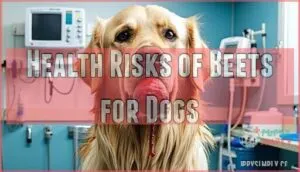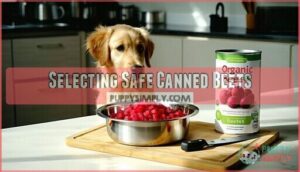This site is supported by our readers. We may earn a commission, at no cost to you, if you purchase through links.

Cook them plain without seasonings and offer small portions – about a teaspoon for small dogs or a tablespoon for larger breeds.
Fresh beets provide fiber, folate, and antioxidants that support digestive health and immune function.
However, beets contain oxalates that may contribute to kidney stones in sensitive dogs, so moderation matters.
Remove the greens, which have higher oxalate levels than the root.
Some dogs might experience harmless red-tinted urine after eating beets – don’t panic, it’s normal.
Start slowly and watch for digestive upset, as the high fiber content can cause stomach issues if introduced too quickly.
Table Of Contents
- Key Takeaways
- Nutritional Benefits of Beets
- Can Dogs Eat Beets Safely
- Health Risks of Beets for Dogs
- Preparation and Serving Methods
- Canned Beets and Alternatives
- Feeding Guidelines for Beets
- Consulting a Veterinarian
- Frequently Asked Questions (FAQs)
- Can dogs eat beets or its harmful?
- Can dogs taste beets?
- Can you feed beets to dogs?
- Are cooked beets toxic to dogs?
- Can my dog eat cooked beets?
- How much beet can I give my dog?
- Can puppies eat beets safely?
- How often should dogs eat beets?
- What happens if dogs eat beetroot leaves?
- Are pickled beets safe for dogs?
- Conclusion
Key Takeaways
- You can safely feed your dog cooked beets in small portions – about 1-2 teaspoons per 15 pounds of body weight, twice weekly maximum
- Always cook beets plain without seasonings and remove the greens, which contain higher oxalate levels than the root
- Watch for potential issues like kidney stones (due to oxalates), digestive upset from high fiber, and harmless red-tinted urine
- Skip beets entirely if your dog has kidney problems or stone history, and consult your vet before introducing any new foods
Nutritional Benefits of Beets
You’ll be surprised to learn that beets pack a nutritional punch that can benefit your dog’s health when served properly.
These vibrant root vegetables contain essential vitamins, minerals, and antioxidants that support everything from digestion to immune function.
Rich in Fiber and Vitamins
Beets pack a nutritional punch for your furry friend.
These vibrant root vegetables deliver essential fiber that supports healthy digestion and keeps things moving smoothly.
You’ll find vitamin C boosting your dog’s immune system, while potassium supports heart function.
Folate, magnesium, and manganese round out the nutrient value, making beets a vitamin boost worth considering for your pup’s dietary needs.
Antioxidant Properties
These powerful compounds pack a punch against cellular damage.
Beets contain betalains and lutein, potent antioxidants that combat free radicals and oxidative stress in your dog’s body.
Here’s how these antioxidant benefits support your pup:
- Cellular Protection – Shield cells from daily damage and aging
- Immune Boosters – Strengthen your dog’s natural defense system
- Anti-inflammatory Effects – Reduce inflammation throughout the body
- Enhanced Recovery – Support healing after exercise or stress
Low in Calories and Fat
When you’re watching your dog’s waistline, beets offer a guilt-free treat option.
These ruby-red vegetables are naturally low in calories and virtually fat-free, making them perfect for weight management strategies.
A small serving provides essential fiber, vitamins, and minerals without derailing your pup’s calorie control goals.
Think of beets as nature’s healthy snacks—they satisfy your dog’s craving for something special while supporting fat reduction efforts through their nutrient-dense, low-calorie profile.
Supports Immune System Health
Rich in antioxidants like betalains and lutein, beets naturally boost your dog’s immune defenses against illness.
These powerful compounds fight oxidative stress while reducing healthy inflammation throughout your pup’s body.
Dogs require a balanced diet that includes understanding oxalic acid risks to maintain peak health.
Key immune system benefits include:
- Antioxidant Benefits – Betalains neutralize harmful free radicals that weaken immunity
- Enhanced Nutrient Absorption – Improved digestion helps your dog utilize immune-supporting vitamins better
- Anti-inflammatory Properties – Natural compounds reduce chronic inflammation that compromises beets and dog health
Can Dogs Eat Beets Safely
The good news is that dogs can eat beets safely when prepared and served correctly. Your furry friend can enjoy this colorful root vegetable as an occasional treat, but there’s a "but" coming – moderation is absolutely key here.
Fresh, organic beets are your best bet for pet safety. You’ll want to scrub them thoroughly, peel off that tough skin, and cook them plain – no salt, butter, or seasonings that could spell trouble for your pup. Think of beets as nature’s candy for dogs; they’re naturally sweet and packed with beet nutrition that supports canine health.
Can dogs eat beets raw? While it’s possible, cooked beets are much easier on their digestive system and less likely to cause choking. Whether you steam, boil, or roast them, keep portions small – about 1-2 teaspoons per 15 pounds of body weight, offered just a couple times weekly.
Watch for dog allergies when introducing beets for dogs into their diet, and remember: beets aren’t toxic to dogs, but preparation matters everything. Understanding bean nutritional benefits can also help you make informed decisions about your dog’s diet.
Health Risks of Beets for Dogs
While beets offer nutritional benefits, they’re not without potential risks for your furry friend. Understanding these concerns helps you make informed decisions about adding beets to your dog’s diet.
Looking at the content about beets and dogs, here’s a short blockquote that matches the tone and captures the key message of that paragraph:
**Beets pack nutrition, but smart pet parents weigh the risks before sharing.
High in Oxalates
With up to 91 mg of oxalates per cup, beets pack serious Oxalate Risks that can spell trouble for your dog’s kidneys.
This Oxalic Acid binds with calcium in urine, creating crystals that lead to painful Kidney Stones and Bladder Stones.
Dogs prone to Urine Issues or previous Stone Formation face heightened Kidney Damage risks, making beets a risky treat choice.
To minimize these risks, it’s necessary to understand beet nutrition facts before sharing them with your dog.
May Cause Digestive Issues
Besides for stomach troubles, beets can trigger digestive problems in dogs when eaten in large amounts.
Your pup’s gut isn’t used to processing high-fiber vegetables, which can lead to uncomfortable GI upset.
Common digestive issues from beets include:
- Gas and bloating from increased fiber intake
- Diarrhea risk due to sudden dietary changes
- Stomach upset from natural sugars and carbohydrates
- Loose stools when portion sizes are too large
- Abdominal discomfort lasting several hours.
Start with tiny portions to test your dog’s tolerance and protect their gut health.
Potential for Kidney Stones
Beets contain high oxalate content that can spell trouble for your dog’s kidneys.
When oxalic acid binds with calcium, it forms crystals that may develop into painful kidney stones or bladder stones, especially in susceptible breeds.
To make informed decisions, understand the beet nutrition facts to guarantee safe consumption.
| Risk Factor | Impact on Dogs |
|---|---|
| High Oxalate Content | Forms crystals in urinary tract |
| Calcium Binding | Creates oxalate crystals leading to stones |
| Breed Susceptibility | Small breeds more prone to stone formation |
| Urinary Issues | Can cause blockages and pain |
Allergic Reactions
Although allergic reactions to beets remain uncommon in dogs, you shouldn’t ignore potential warning signs.
Watch for skin allergies manifesting as canine itching, hives, or redness around your dog’s face and paws.
Food sensitivities might trigger swelling, excessive scratching, or digestive upset.
If you notice any allergic symptoms or reaction signs after introducing beets, discontinue feeding immediately and consult your veterinarian to address potential allergic reactions.
Preparation and Serving Methods
If you’re planning to share beets with your dog, proper preparation makes all the difference between a healthy treat and a potential health risk.
The key lies in choosing fresh beets and preparing them safely to maximize benefits while minimizing digestive upset, which is crucial for a healthy treat.
Choosing Fresh and Organic Beets
When shopping for your furry friend, selecting fresh, organic beets guarantees you’re avoiding harmful pesticides and chemicals.
Look for firm, smooth-skinned beets without soft spots or blemishes.
Organic farming practices mean cleaner produce, making beet safety a priority when considering can dogs eat beets.
For maximum health benefits, consider using organic dog products in their meals, as organic options provide the best nutritional value for dogs and beets compatibility in your pup’s diet.
Cleaning and Cutting Beets
Fresh beets need thorough preparation before feeding your furry friend. Start by scrubbing them under cool water to remove dirt and debris.
You’ll want to peel the tough outer skin since it’s hard for dogs to digest. Use a sharp knife or vegetable peeler for safe beet peeling.
Cut into small, bite-sized pieces to prevent choking hazards, especially for smaller dogs.
Effective beet peeling tools, such as a beet peeler device, can make this process easier, and help with thorough preparation.
Cooking Methods for Beets
Once you’ve cleaned and prepared your beets, choosing the right cooking method makes all the difference for your dog’s safety and nutrition.
- Steaming Beets: Preserves up to 90% of folate and vitamin C while making them gentle on sensitive stomachs
- Roasting Methods: Enhances natural sweetness and maintains potassium levels – just skip the oil
- Boiling Techniques: Creates softer texture for easier digestion, though some water-soluble vitamins may diminish
- Baking Beets: Concentrates flavors naturally without added fats, perfect for homemade dog treats
Avoiding Harmful Seasonings
Once you’ve perfectly cooked your beets, never add salt, butter, garlic, onion, or other seasonings that create toxic ingredients dangerous for dogs.
These harmful additives can cause serious health problems. Keep it simple – plain, unseasoned beets are the dog-friendly choice.
Your pup doesn’t need fancy flavors, just safe, wholesome beetroot for dogs without seasoning dangers. It’s also essential to understand pepper seasoning risks when preparing meals for your dog.
Canned Beets and Alternatives
While fresh beets offer the best nutritional value, you can occasionally give your dog plain canned beets if they contain no added salt, sugar, or seasonings.
If beets don’t suit your pup, safer alternatives like carrots, sweet potatoes, and green beans provide similar fiber and nutrients without the high oxalate content.
Selecting Safe Canned Beets
When choosing canned beets for your dog, read labels carefully to avoid added sodium and preservatives that can harm pets.
Select organic options when possible to minimize pesticide exposure. Look for plain, unsalted varieties without xylitol or onion powder.
Check beet recall alerts regularly for safety updates. Can dogs eat beets safely? Yes, but canned beets require extra scrutiny for puppy-safe ingredients.
For a healthier option, consider purchasing organic food products to guarantee the best nutrition for your pet.
Alternative Vegetables for Dogs
If you’re exploring vegetables for dogs beyond beets, carrots offer excellent carrot benefits with lower sugar content than sweet potato options.
Green beans provide safe, low-calorie nutrition, while radish safety makes them suitable occasional treats.
Parsnip nutrition includes fiber and vitamins, these vegetables for dogs support beets in dog diet variety, especially when considering beets safe for puppies and overall dog digestive beets health.
Introducing Beets Into a Dog’s Diet
When introducing beets into your dog’s diet, start with tiny amounts to test for beet allergy reactions.
Begin with just a quarter teaspoon for small dogs, gradually increasing over several days while monitoring dog digestion. This slow approach helps identify any pet safety concerns early.
Diet planning should include beets as occasional treats, not daily staples.
Can puppies eat beets? Yes, but in even smaller portions than adult dogs require for ideal beet nutrition.
Feeding Guidelines for Beets
You’ll want to feed beets sparingly since too much can cause stomach upset or kidney issues in sensitive dogs.
Start with tiny amounts and watch how your pup reacts before making beets a regular treat.
Moderation is Key
When feeding beets to your dog, think "less is more."
These colorful root vegetables pack powerful nutrients, but they’re not meant to replace your pup’s balanced diet.
Stick to healthy portions—about 1-2 teaspoons per 15 pounds of body weight, twice weekly.
This safe serving approach guarantees your dog enjoys beet nutrition without overloading on oxalates or sugars that make beets potentially problematic.
Dogs Prone to Kidney Stones
If your dog has a history of kidney stones, you’ll want to skip beets entirely.
These ruby-red veggies pack high oxalate levels that spell trouble for canine kidney health.
Oxalate stones form when these compounds bind with calcium in your pup’s system.
Stone prevention becomes your top priority, meaning dietary restrictions are non-negotiable.
Your vet will likely recommend avoiding beets toxic to dogs with urinary health issues completely, as they can cause significant problems for dogs with a history of kidney stones.
Potential Digestive Issues
Beet-induced stomach troubles can catch you off guard.
Your dog’s digestive system may struggle with beets’ high fiber content, causing gas symptoms and bowel issues.
Raw beets are particularly hard on canine digestion, potentially triggering stomach upsets.
The natural sugars can also disrupt gut health, leading to digestive problems that affect overall digestive health, including issues related to high fiber content.
Monitoring for Adverse Reactions
When you introduce beets to your dog’s menu, watch for telltale signs that something’s amiss.
Allergy signs like itching, swelling, or hives require immediate attention.
Digestive issues including vomiting, diarrhea, or excessive gas signal your pup’s system isn’t handling beetroot well.
Skin problems and reddish urine changes are normal but can mask serious health warnings, and it’s crucial to monitor closely since adverse reactions vary between dogs, including signs like digestive issues.
Consulting a Veterinarian
Before adding beets to your dog’s diet, you’ll want to check with your veterinarian first.
This becomes especially important if your pup has existing health conditions like kidney problems or diabetes, since beets contain oxalates and natural sugars that could worsen these issues, particularly because they could exacerbate conditions due to the presence of oxalates.
Importance of Professional Advice
Your veterinarian’s expertise makes all the difference when considering whether beets are safe for dogs.
Professional pet nutrition guidance helps identify if your pup’s health conditions make beets risky, and expert opinion on diet planning guarantees you’re not accidentally creating problems.
Health consultations reveal if dogs and beet juice mix well with medications, and veterinary advice considers your dog’s unique needs before adding any new foods, ensuring a safe and healthy diet with the help of professional pet nutrition.
Underlying Health Conditions
Certain medical conditions require extra caution when considering beets for your dog.
Dogs with diabetes management needs should avoid beets due to their natural sugar content, which can spike blood glucose levels.
Those with kidney disease or prone to kidney issues face increased risks from beet oxalates.
Canine allergies, though rare, can trigger digestive problems or skin reactions requiring immediate veterinary attention.
Regular veterinary check-ups can help identify and manage common pet issues that may affect a dog’s ability to safely consume beets.
Creating a Balanced Diet
Your vet can help you design a thorough meal plan where beets safe for dogs fit naturally into your pup’s overall nutrition.
Proper Diet Planning guarantees beets good for dogs complement rather than replace essential nutrients.
They’ll guide Feeding Strategies for Calorie Control and Meal Scheduling that maintains Nutrient Balance while incorporating beet nutrition dogs need safely.
Frequently Asked Questions (FAQs)
Can dogs eat beets or its harmful?
Dogs can eat beets safely, but there’s a catch.
While they’re packed with fiber, vitamin C, and antioxidants that support digestion and immunity, beets contain oxalates that can form kidney stones in susceptible pups when overfed.
This is a single concept so no further separation is needed.
Can dogs taste beets?
Yes, dogs can taste beets.
Their taste buds detect sweet flavors, so they’ll likely enjoy beets’ natural sweetness.
However, dogs have fewer taste buds than humans, making their perception less intense than yours.
Can you feed beets to dogs?
Yes, you can feed beets to dogs in moderation.
Cook them plain without seasonings, serve small portions, and introduce gradually.
Beets contain beneficial nutrients but also oxalates that may cause kidney stones in susceptible dogs.
Are cooked beets toxic to dogs?
Cooked beets aren’t toxic to dogs, but they’re not ideal treats.
They contain oxalates that can contribute to kidney stones and high sugar content that may cause digestive upset.
Serve sparingly if at all.
Can my dog eat cooked beets?
Your dog can safely eat cooked beets in small amounts as an occasional treat.
They’re packed with fiber, vitamins, and antioxidants that support digestion and immune health.
Their high oxalate content means moderation is key.
How much beet can I give my dog?
Give your dog 1-2 teaspoons of cooked beets per 15 pounds of body weight, just a couple times weekly.
Start with smaller amounts to check for digestive upset or allergic reactions first.
Can puppies eat beets safely?
Like tiny explorers venturing into new territory, puppies can eat small amounts of cooked beets occasionally.
Their developing digestive systems handle plain, peeled, mashed beets better than raw ones.
Start with tiny portions to avoid stomach upset, and remember that plain beets are easier for them to digest.
How often should dogs eat beets?
You should offer beets to your dog only occasionally, about 1-2 times per week maximum.
Limit portions to 1-2 teaspoons per 15 pounds of body weight to prevent oxalate buildup and digestive issues.
What happens if dogs eat beetroot leaves?
Beetroot leaves contain high levels of oxalates that can cause kidney stones and digestive upset in dogs.
You should avoid feeding your dog beet greens entirely, as they’re more toxic than the beetroot itself.
Are pickled beets safe for dogs?
No, pickled beets aren’t safe for dogs.
Your neighbor’s pup got sick after sneaking pickled beets from a jar—they contain added salt and sugar that can cause dehydration and digestive upset, potentially leading to serious health issues.
Conclusion
Ultimately, you can dogs eat beets when you follow proper preparation guidelines.
Cook them plain, serve in moderation, and remove the greens to minimize oxalate exposure.
While beets offer valuable nutrients like fiber and antioxidants, they’re not essential for your dog’s diet.
Monitor your pet for digestive upset or unusual urine coloration after introducing this colorful root vegetable.
Always consult your veterinarian before adding new foods, especially if your dog has kidney issues or dietary restrictions.

















